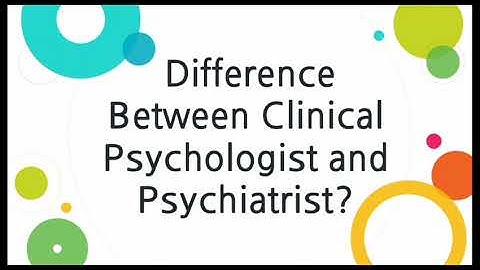People often confuse psychologists with psychiatrists (and vice versa). It’s a common mistake. After all, their titles sound similar and both medical professionals are trained to diagnose and treat individuals with mental health conditions. However, psychologists and psychiatrists are not the same. Show Let’s explore the differences between a psychologist and a psychiatrist. Psychologists vs. Psychiatrists – Differences in Practice and EducationAlthough they are both licensed professionals, psychologists and psychiatrists each have distinctive training, educational background, and they each play a specific role in mental health treatment. Differences in EducationSimilar to any other medical doctor, psychiatrists attend medical school. Upon completing medical school they graduate with one of two degrees:
After they obtain their degree, psychiatrists must complete a four-year residency program followed by a written exam to get licensed to practice medicine. Additionally, some psychiatrists receive extra training in a specialty, such as:
Depending on their specific track, psychologists complete graduate school and sometimes doctoral-level training. It can take two to six years to complete one of these degree programs. Upon graduating, psychologists generally receive one of the following degrees:
Once they’ve earned their degree, psychologists complete another one to two years of clinical training which entails working with people. Other Doctoral Psychology programs do not qualify their recipients to work individuals and perform clinical work. Similar to a psychiatrist, psychologists are required to take an exam to become licensed to practice in their area. Like psychiatrists, some psychologists become trained in a specialty, such as:
Differences in PracticePsychologists and psychiatrists use different tools to treat mental health conditions. On one hand, psychologists commonly treat individuals with psychotherapy. Also referred to as talk therapy, psychotherapy is a term for a variety of treatment techniques aimed to help an individual identify and change troubling thoughts, emotions, and behaviors. Through the course of several sessions, a psychologist will work with their patient to help them better understand their symptoms and how to manage them. Talk therapy can take many forms, including:
On the other hand, Psychiatrists diagnose mental health conditions using a variety of tools, including one-on-one evaluations, psychological tests, and lab tests to rule out physical causes of symptoms. Like other doctors, they are able to treat their patients with prescription medications. They can also prescribe other types of treatments, such as electroconvulsive therapy or light therapy. Psychologists cannot prescribe medications. Psychiatrists and psychologists often collaborate together to treat individuals mental health concerns such as:
Working TogetherDepending on their medical diagnosis, psychiatrists often work with psychologists, combining prescription treatments and therapy sessions. Psychologists often see their patients on a weekly basis for therapy sessions. Psychiatrists may see their patients weekly or monthly for psychotherapy and/or psychopharmacology, depending on the patient’s clinical needs. Psychologists and psychiatrists often work in the same facilities, to include:
Which is Best for You?Depending on the course of treatment you decide to choose, you may be better suited for either a psychologist or a psychiatrist. For example, if you are seeking to overcome trauma or work through a difficult experience (such as divorce or a death), you would benefit from a psychologist. However, if you feel that your condition is too fragile at the moment to be able to discuss it in talk therapy then medication could help you take that first step towards treatment. At BE Psychology Center for Emotional Wellbeing, our team of professional psychologists is dedicated to helping you achieve your therapeutic goals to live a happier and healthier life. Our custom-tailored consulting services are designed to empower individuals to overcome their struggles, so they can become the best version of themselves. Contact a member of our team to learn about how visiting a psychologist in Dubai can improve your life.
 Reem Shaheen – LMHC   Is psychologist better or psychiatrist?Psychiatrists can prescribe medicine, Psychologists can not. Psychiatrists are doctors of medicine and are legally equipped to prescribe medications to patients.
What is difference between psychologist and psychiatrist?Differences in Practice
Psychotherapy can be provided by both psychologists and psychiatrists. Psychiatrists, on the other hand, are more likely to prescribe medicine, whilst psychologists are more likely to provide talk and/or behavioral treatment.
|

Advertising
LATEST NEWS
Advertising
Populer
Advertising
About

Copyright © 2024 berikutyang Inc.










